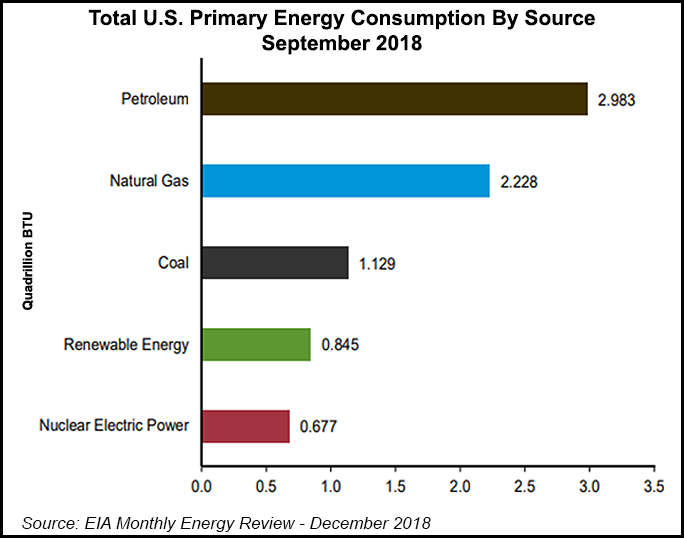Regulatory | Infrastructure | Markets | NGI All News Access | NGI The Weekly Gas Market Report
Green New Deal Part 2: Oil & Gas Industry Cautiously Watching Developments
* Part two of two. This series looks at the potential impact a Green New Deal could have on the oil and gas industry. This installment examines the oil and gas industry’s current posture toward the proposal, as well the reaction from lawmakers on both sides of the aisle. In part one, an environmental activist and a conservative economist revealed the merits and drawbacks of the sweeping proposal.

Representatives for the oil and gas industry said they were cautiously watching developments surrounding a plan to have all of the nation’s electricity generated by renewables in a decade, but trade associations for the industry continue to hold firm that natural gas has helped significantly reduce greenhouse gas emissions over the last decade, and it will continue to play an important role in the nation’s energy mix moving forward.
Meanwhile, Congress is divided mostly along partisan lines over the plan, aka the Green New Deal (GND). While many incoming House Democrats, especially its younger members, support the plan, Senate GOP lawmakers blasted it as “a crazy, expensive mess” that would cost $7 trillion.
Industry Urges Expanded Infrastructure
“Infrastructure has the potential to be one of the most bipartisan issues in the new Congress, and natural gas pipelines are an important part of our nation’s critical infrastructure,” said Interstate Natural Gas Association of America CEO Don Santa. “Put simply, the GND can’t happen without natural gas, so supporting natural gas infrastructure should be a priority for members on both sides of the aisle.”
The American Petroleum Institute concurred, adding that “expanding energy infrastructure is critical to ensuring that consumers, workers and the environment can continue to benefit from the record U.S. energy production that has boosted our economy and increased our national security over the past decade.
“The bottom line is that natural gas and oil production in America is among the cleanest in the world. Our industry continues to demonstrate that meeting record demand and protecting the environment are not mutually exclusive, and has done so while building toward a cleaner, safer, better future.”
Although the American Gas Association (AGA) didn’t have a comment on the GND specifically, it did release a report in September that found “policy-driven electrification could be burdensome to consumers and to the economy, have profound impacts and costs on the electric sector and amounts to a very costly approach for a relatively small reduction in emissions.”
AGA spokesman Jake Rubin added that when the details surrounding the GND are released, the trade group “will look at how it treats the direct use of natural gas in homes and businesses for heating, cooking and clothes drying.”
Congress Divided
With Democrats just days away from taking control of the House, a partisan divide over the GND appeared to be widening. Rep.-elect Alexandria Ocasio-Cortez (D-NY) has consistently been one of the plan’s most ardent supporters.
“We need to act. We need a GND,” Ocasio-Cortez said on Twitter on Dec. 21. “Climate change isn’t happening in 10 years. It’s happening now. We need large, immediate investment now to protect our shores from rising sea levels…”
Eight days after the midterms, Reps. Frank Pallone of New Jersey, Raúl Grijalva of Arizona and Eddie Bernice Johnson of Texas issued a joint statement promising to “hit the ground immediately with a series of hearings early in the next Congress on how best to combat this growing global crisis.” They added that the hearings would be held over a two-day period. Pallone will chair the powerful House Energy & Commerce Committee in the next Congress, while Grijalva will chair the House Natural Resources Committee.
But in the Senate, where the GOP will maintain control, lawmakers were taking aim at the GND.
“While the plan is being sold as a solution to climate change and a jobs program, it would cost trillions, and it ignores the rest of the world’s contribution to climate change,” the RPC said in a policy paper. The group added that “producing 100% of electricity from renewable sources is a practical impossibility in the near future. Scientists doubt it would be achievable by 2050, let alone 2029, the deadline Democrats would set.
“Such a massive overhaul in power generation would require the closure and replacement of about 83% of U.S. electricity generation, including all coal, natural gas, and nuclear plants.”
Late last month, Rep. Nancy Pelosi (D-CA), who is expected to become the next House speaker, tapped Rep. Kathy Castor (D-FL) to chair a new panel, to be named the House Select Committee on the Climate Crisis. Pelosi said Castor “will bring great experience, energy and urgency to the existential threat of the climate crisis. This committee will be critical to the entire Congress’s mission to respond to the urgency of this threat, while creating the good-paying, green jobs of the future.”
© 2024 Natural Gas Intelligence. All rights reserved.
ISSN © 1532-1231 | ISSN © 2577-9877 | ISSN © 1532-1266 |
